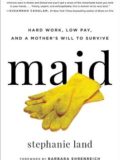 Evicted meets Nickel and Dimed in Stephanie Land’s memoir about working as a maid, a beautiful and gritty exploration of poverty in America. Includes a foreword by Barbara Ehrenreich.
Evicted meets Nickel and Dimed in Stephanie Land’s memoir about working as a maid, a beautiful and gritty exploration of poverty in America. Includes a foreword by Barbara Ehrenreich.
At 28, Stephanie Land’s plans of breaking free from the roots of her hometown in the Pacific Northwest to chase her dreams of attending a university and becoming a writer, were cut short when a summer fling turned into an unexpected pregnancy. She turned to housekeeping to make ends meet, and with a tenacious grip on her dream to provide her daughter the very best life possible, Stephanie worked days and took classes online to earn a college degree, and began to write relentlessly. She wrote the true stories that weren’t being told: the stories of overworked and underpaid Americans. Of living on food stamps and WIC (Women, Infants, and Children) coupons to eat. Of the government programs that provided her housing, but that doubled as halfway houses. The aloof government employees who called her lucky for receiving assistance while she didn’t feel lucky at all. She wrote to remember the fight, to eventually cut through the deep-rooted stigmas of the working poor.
Maid explores the underbelly of upper-middle class America and the reality of what it’s like to be in service to them. “I’d become a nameless ghost,” Stephanie writes about her relationship with her clients, many of whom do not know her from any other cleaner, but who she learns plenty about. As she begins to discover more about her clients’ lives-their sadness and love, too-she begins to find hope in her own path.
Her compassionate, unflinching writing as a journalist gives voice to the “servant” worker, and those pursuing the American Dream from below the poverty line. Maid is Stephanie’s story, but it’s not her alone. It is an inspiring testament to the strength, determination, and ultimate triumph of the human spirit.
About the Author
Journalist Stephanie Land‘s work has been featured in The New York Times, The Washington Post, The Guardian, Vox, Salon, and many other outlets. She focuses on social and economic justice as a writing fellow through both the Center for Community Change and the Economic Hardship Reporting Project.
BARBARA EHRENREICH is the author of fourteen books, including the bestselling Nickel and Dimed and Bait and Switch. She lives in Virginia.
Advance praise for Maid
“Marry the evocative first person narrative of Educated with the kind of social criticism seen in Nickel and Dimed and you’ll get a sense of the remarkable book you hold in your hands. In Maid, Stephanie Land, a gifted storyteller with an eye for details you’ll never forget, exposes what it’s like to exist in America as a single mother, working herself sick cleaning our dirty toilets, one missed paycheck away from destitution. It’s a perspective we seldom see represented firsthand-and one we so desperately need right now. Timely, urgent, and unforgettable, this is memoir at its very best.”—Susannah Cahalan, #1 New York Times bestselling author of Brain on Fire: My Month of Madness
“Stephanie Land’s heartrending book, Maid, provides a trenchant reminder that something is amiss with the American Dream and gives voice to the millions of ‘working poor’ toiling in a country that needs them but doesn’t want to see them. A sad and hopeful tale of being on the outside looking in, the author makes us wonder how’d we fare scrubbing and vacuuming away the detritus of an affluence that always seems beyond reach.”—Steve Dublanica, New York Times bestselling author of Waiter Rant
“As a solo mom and former house cleaner, this brave book resonated with me on a very deep level. We live in a world where the solo mother is an incomplete story: adrift in the world without a partner, without support, without a grounding, centering (male) force. But women have been doing this since the dawn of time, and Stephanie Land is one of millions of solo moms forced to get blood from stone. She is at once an old and new kind of American hero. This memoir of resilience and love has never been more necessary.”—Domenica Ruta, New York Times bestselling author of With or Without You
“For readers who believe individuals living below the poverty line are lazy and/or intellectually challenged, this memoir is a stark, necessary corrective…. [T]he narrative also offers a powerful argument for increasing government benefits for the working poor during an era when most benefits are being slashed…. An important memoir that should be required reading for anyone who has never struggled with poverty.”—Kirkus Reviews, starred review
“[A] heartfelt and powerful debut memoir…. Land’s love for her daughter… shines brightly through the pages of this beautiful, uplifting story of resilience and survival.”
—Publishers Weekly, starred review
“Tells an honest story many are too afraid to examine.”—SheKnows.com
“[A] vivid and visceral yet nearly unrelenting memoir… Her journey offers an illuminating read that should inspire outrage, hope, and change.”—Library Journal
“Raw…Land [is] a gifted storyteller…Offers moments of levity…[Maid] shows we need to create an economy in which single
motherhood and the risk of poverty do not go hand in hand.”—Ms. Magazine
“Maid delves into her time working for the upper middle class in the service industry, and in it, uncovers the true strength of the human spirit.”—San Diego Entertainer, Books to Kick Off Your New Year
“An eye-opening exploration of poverty in America.”—Bustle
“Takes readers inside the gritty, unglamorous life of the underpaid,
overworked people who serve the upper-middle class for a living.”—Parade
“In a country whose frayed safety net gets less policy attention than the
marginal tax rate, Land is the anomaly not only in surviving to tell the
tale – and in telling it with such compelling economy.”—Vulture, 8 New Books You Should Read this January
“It is with beautiful prose that Land chronicles her time working as a
housekeeper to make ends meet…Captur[es] the experience of hardworking
Americans who make little money and are often invisible to their
employers.”—Boston.com, 20 Books to Read in 2019
“Land’s memoir forces readers to examine their implicit
judgments about what we mean by the value of hard work in America and societal
expectations of motherhood.”—Electric Lit

 How are young women supposed to see each other clearly when they can’t even see themselves? This razor-sharp novel “perfectly captures [the] power dynamics and identity issues that . . . women are forced to face.”—Marie Claire (Must-Read Books of 2019)
How are young women supposed to see each other clearly when they can’t even see themselves? This razor-sharp novel “perfectly captures [the] power dynamics and identity issues that . . . women are forced to face.”—Marie Claire (Must-Read Books of 2019) Fiona and Liv are seniors at Buchanan College, a small liberal arts school in rural Pennsylvania. Fiona, who is still struggling emotionally after the death of her younger sister, is spending her final college year sleeping with abrasive men she meets in bars. Liv is happily coupled and on the fast track to marriage with an all-American frat boy. Both of their journeys, and their friendship, will be derailed by the relationships they develop with Oliver Ash, a ruggedly good-looking visiting literature professor whose first novel was published to great success when he was twenty-six.
Fiona and Liv are seniors at Buchanan College, a small liberal arts school in rural Pennsylvania. Fiona, who is still struggling emotionally after the death of her younger sister, is spending her final college year sleeping with abrasive men she meets in bars. Liv is happily coupled and on the fast track to marriage with an all-American frat boy. Both of their journeys, and their friendship, will be derailed by the relationships they develop with Oliver Ash, a ruggedly good-looking visiting literature professor whose first novel was published to great success when he was twenty-six.










 “Golden State is a gripping and brainy page-turner. Winters asks his readers to imagine California as a sovereign (and surveillance) state in which intentionally lying is the greatest federal offense. The ‘Byzantine business of reality maintenance’ is carried out by a team of federal agents, including our hero, Laszlo Ratesic. Golden State is a mystery in both form and content. In addition to the seemingly simple incident Laszlo investigates at the start of the novel, there’s the bigger question of what a novel really is, or means, or can do in the ‘good, golden, safe’ world its readers are transported to. Winters is especially good at keeping his readers off-balance. Not even his biggest fans will see some of the twists and turns he’s built into this, his best book yet.”
“Golden State is a gripping and brainy page-turner. Winters asks his readers to imagine California as a sovereign (and surveillance) state in which intentionally lying is the greatest federal offense. The ‘Byzantine business of reality maintenance’ is carried out by a team of federal agents, including our hero, Laszlo Ratesic. Golden State is a mystery in both form and content. In addition to the seemingly simple incident Laszlo investigates at the start of the novel, there’s the bigger question of what a novel really is, or means, or can do in the ‘good, golden, safe’ world its readers are transported to. Winters is especially good at keeping his readers off-balance. Not even his biggest fans will see some of the twists and turns he’s built into this, his best book yet.”
 Evicted meets Nickel and Dimed in Stephanie Land’s memoir about working as a maid, a beautiful and gritty exploration of poverty in America. Includes a foreword by Barbara Ehrenreich.
Evicted meets Nickel and Dimed in Stephanie Land’s memoir about working as a maid, a beautiful and gritty exploration of poverty in America. Includes a foreword by Barbara Ehrenreich.